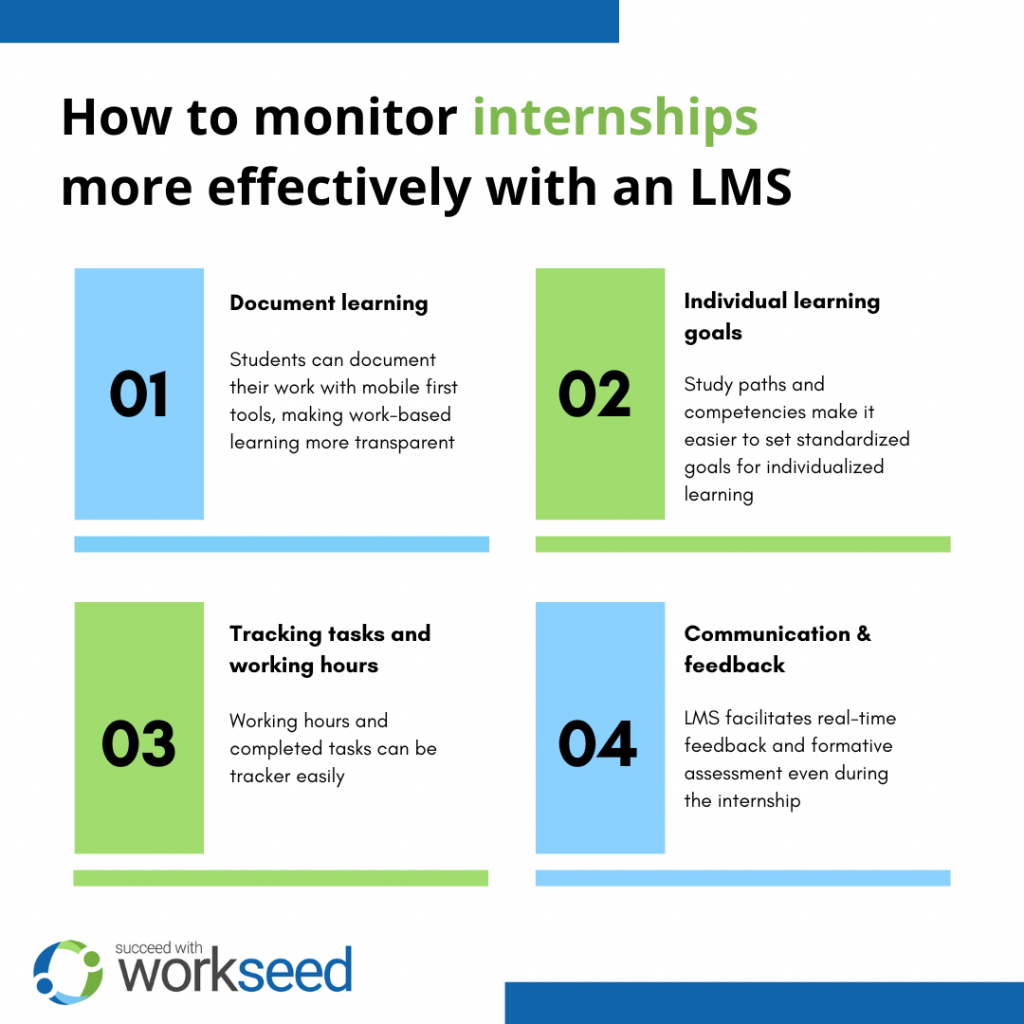Internships are a vital component of higher education, bridging the gap between academic learning and real-world experience. These work-based learning opportunities enable students to gain invaluable industry exposure while applying the theoretical knowledge they have acquired in the classroom.
At the same time, it is often challenging to monitor internships and support learning that takes place at work. While students are immersed in dynamic and realistic work environments, teachers and academic supervisors may find it difficult to provide the consistent guidance and support students need to maximize their learning experience.
This is where Learning Management Systems (LMS) come into play. LMS platforms empower educators to closely monitor internship progress, facilitate communication, and offer targeted support to students—no matter where they are working. By leveraging these tools, educators can ensure students feel supported and stay on track with their academic and professional goals.
Keep reading to discover innovative ways LMS solutions are transforming the way teachers monitor internships and enhancing student learning outcomes.
Why is it so difficult to monitor internships
Monitoring work-based learning poses significant challenges, as we have outlined here. Internships, by their very nature, involve students acquiring practical skills in realistic and often unpredictable environments. These experiences are typically guided by individualized learning goals tailored to each student’s unique needs and career aspirations.
However, these same characteristics make internships inherently difficult to track and assess effectively. Learning takes place in settings where contact between students and teachers is often minimal, if not entirely absent. This limited interaction can make it challenging to establish and apply meaningful metrics that reflect the specific goals and progress of individual learners.
In the worst-case scenario, teachers may only gain insight into what occurred during the internship once students submit their final reports. If any issues arose during the internship, they likely went unaddressed. As a result, students may have missed out on crucial opportunities for meaningful feedback or formative assessment, leaving gaps in their learning and professional development.
Fortunately, these challenges can be mitigated, if not entirely resolved, with the use of an appropriate digital learning management system (LMS) to monitor internships. A well-designed LMS provides tools for flexible monitoring, real-time feedback, and effective communication between students and teachers, ensuring that problems are identified and addressed promptly. This proactive approach enhances the overall learning experience and fosters better outcomes for all parties involved.
Flexible internship tracking with Workseed LMS
Learning management systems (LMS) can transform the way teachers monitor internships. They provide tools for flexible documentation of learning, centralized communication, and automated tools to monitor internships – regardless of how, where, or when learning occurs. This ensures that both students and educators can effectively navigate the challenges of work-based learning.
The Workseed learning management system offers a suite of features specifically tailored for work-based and competency-based learning. These capabilities make it easier to monitor internships and support students and optimize their learning experiences, even in practical, real-world settings.
Students can make practical learning visible. An LMS allows students to document their practical learning. With tools to document learning in realistic environments, students can maintain comprehensive learning diaries, build a robust portfolio, and reflect on their experiences. These features enable students to demonstrate their progress and growth effectively. Simultaneously, teachers gain critical insight into the learning process, allowing them to monitor internships and other forms of work-based learning.
Learning paths allow tracking individual goals. Internships often rely on individualized learning goals, which can make standardizing metrics for tracking progress a challenge. Competency-based learning paths address this by creating structured workflows for monitoring each student’s progress toward their unique objectives. These paths ensure alignment between learning goals and outcomes, benefiting all stakeholders. Students gain clarity on what is expected of them, allowing them to focus on achieving their goals Teachers can quickly identify students who may be falling behind and provide timely, targeted support to keep them on track.
Tracking tasks and working hours. An LMS can also be used to track practical elements like tasks completed, working hours logged, and even attendance if necessary. This functionality is particularly valuable in fields where formal competencies require a specific amount of time dedicated to particular tasks. For instance, the Workseed LMS includes tools that allow students to log working hours per task during internships, ensuring compliance with program requirements and professional standards.
Centralized communication facilitates feedback. Centralized communication is another crucial feature of an effective LMS. By providing a single platform for interaction, teachers and supervisors gain better insights into how internships are progressing. This enables them to offer constructive feedback and formative assessments promptly. Such real-time support allows teachers to monitor internships and guide students even remotely.

Want to improve internship management in your organization?
Workseed is a learning management system specifically designed for work-based learning and internships. With its robust features to monitor internships and reporting tools, Workseed streamlines the entire internship process. Students can easily track their progress, teachers can monitor student activities during internships, and supervisors can provide timely formative assessments and guidance.
This powerful platform is widely adopted by Finnish universities of applied sciences, where it plays a pivotal role in managing internships and coordinating work-based learning programs. Workseed simplifies the process for academic institutions, from handling administrative tasks like signing contracts to delivering insightful assessments that align with both academic and professional requirements.
Want to learn more about how Workseed can transform internship tracking in higher education? Discover our features tailored to meet the needs of academic institutions here.
Experience the benefits firsthand by booking a personalized product demonstration here. Our experts will walk you through how Workseed can help your department improve internship management, from streamlining workflows to enhancing student outcomes.
Start managing internships with ease and effectiveness today!










